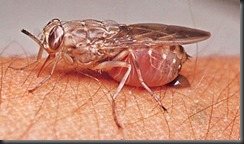The tsetse fly carries a parasite the caused trypanosomiasis or "sleeping sickness" in humans and animals. The parasite enters the brain from the blood system and then invades the central nervous system. This results in changes to the human sleep rhythms and perceptions of the world. Often the victim loses coordination of the body, too. 
Its has had a powerful impact upon world history in that those spreading the Islamic faith south in Africa, following the time of Mohammad, were riding horses that were also impacted by the tse-tse. The southward spread of Islam was thus limited in Africa. Hence northern Nigeria is Islamic and southern Nigeria is not, etc.
The World Health Organization of the United Nations describes this disease in the following: "The tsetse fly bite erupts into a red sore and within a few weeks the person can experience fever, swollen lymph glands, aching muscles and joints, headaches and irritability. In advanced stages, the disease attacks the central nervous system, causing changes in personality, alteration of the biological clock (the circadian rhythm), confusion, slurred speech, seizures, and difficulty walking and talking. These problems can develop over many years in the Gambiense form and some months in the Rhodesiense form; if not treated, the person will die." [See World Health Organization. 2012. http://www.who.int/topics/trypanosomiasis_african/en/ ]